I've had the chance to brew and drink many coffee offerings from Kickapoo Coffee. This artisan roaster is located in Viroqua Wisconsin and, apart from the great coffee, they distinctively sell their goods in old school metal cans. Kickapoo has a history of roasting some fine quality coffee from Africa and their Ethiopian beans have won awards in the past.
As of late, they have been offering some beans from the Muungano Cooperative in the Congo. Muungano is a member of the Joint Marketing Initiative. JMI pairs up with British-based TWIN to not only bring JMI coffees to the world market, but also helps with development, certifications, and is committed to fair trade. Munngano is located near Lake Kivu in the eastern Congo. The coffee they grow are Bourbon varietals of Arabica.
Kickapoo light roasts these Bourbons and opening the sealed can brings forth some really rich cranberry and tart cherry flavors. The beans are larger than what one sees in Ethiopian Yirgacheffe and are fairly typical for Bourbon.
The coffee brewed from these beans has a fantastic berry taste and is not mellow by any means. This coffee has a great kick and has a spicy taste working through the cup. Its full bodied but not overpowering. It doesn't pack the caffeine punch that a peaberry coffee has but compared to Kickapoo's current Kenyan Peaberry, I think Congo Munngano is better overall. I wouldn't be surprised to see this offering score an award somewhere.
Brewed in a Vesuviana and French Press.
Also of note; Kickapoo Coffee cans can serve other roles after the have been drained of the coffee. Plant pots and desktop pen/pencil storage come to mind. Can collectors who love coffee might also find the deco-esque trade dress to be attractive and decorative.
The Iced Mocha
This blog is devoted to coffee, coffee brewing and links to coffee stories, and is a forum for me to share my own reviews and opinions about coffees that I have tried.
Sunday, April 27, 2014
Saturday, November 2, 2013
Ethiopian Peaberry SCFCU by Blue Bottle Coffee Co.
Today, I'm brewing some terrific coffee from Ethiopia. Blue Bottle Coffee, named one of the best coffee roasters in the United States in 2013, recently offered Ethiopian Peaberry from the Sidama Coffee Farmers Cooperative Union (SCFCU) in 16oz bags. Now this offering combines two of my favorite things: Ethiopian coffee and nature's nuclear power plant known as the peaberry.
The bean only has one coffee cherry instead of the normal two so it's a compact little bugger filled with highly concentrated energy. Blue Bottle has light roasted these miniature coffee beans and not only do they pack an intense flavor, the coffee packs a wicked punch.
Opening up the brown paper recyclable bag, bearing the simple Blue Bottle mark, my nose was met with a near tropical sweet melon aroma and that flavor transfered into the actual drink.
The coffee is very light but doesnt have the heavy citrus body that characterizes some Yirgacheffe coffee beans; something I am not the biggest fan of. Blue Bottle's Ethiopian Peaberry doesn't emit the cherry tartness that I've noticed in several other Ethiopian offerings, but it does have a smattering of chocolate underlying the tropical taste. The transition from tropical flavors to cocoa as I worked through the coffee was really a fantastic combination that played off each other marvelously. The caffene punch in this coffee is stronger than an Iron Man comptetion. It will keep you awake during the routine of a long workday and will leave you with a hankering for another cup.
It looks like Blue Bottle is no longer offering this coffee at the moment, but they do have other single origina selections from Africa that are no doubt excellent.
The coffee is very light but doesnt have the heavy citrus body that characterizes some Yirgacheffe coffee beans; something I am not the biggest fan of. Blue Bottle's Ethiopian Peaberry doesn't emit the cherry tartness that I've noticed in several other Ethiopian offerings, but it does have a smattering of chocolate underlying the tropical taste. The transition from tropical flavors to cocoa as I worked through the coffee was really a fantastic combination that played off each other marvelously. The caffene punch in this coffee is stronger than an Iron Man comptetion. It will keep you awake during the routine of a long workday and will leave you with a hankering for another cup.
It looks like Blue Bottle is no longer offering this coffee at the moment, but they do have other single origina selections from Africa that are no doubt excellent.
Monday, May 13, 2013
Ethiopian Guji Shakiso By Metropolis, A Magical Coffee Experience
Metropolis Coffee has been one of Chicago's gateway's to fantastic types of coffees from around the world, either by blend or single origins. I have greatly enjoyed most of their offerings. Visitors to this blog can probably pick up that I love Ethiopian coffees. Maybe its because I love baked goods (I can hear my dentist cringe), but fruit and chocolate tinged coffee flavors really get my palette going.
Metropolis recently offered Ethiopian coffee from the Guji zone of Oromia in the south of Ethiopia. This coffee is wet processed, not dry, and according to Metropolis' product sheet is grown at elevations of 1700-1850 meters.
Metropolis, like their other products, offered these beans in 12oz valved packages. The beans are typical in size for geographically similar beans, (smaller sized), and are more lightly roasted. Dark roasting beans like this would be blasphemous!!!
Metropolis recently offered Ethiopian coffee from the Guji zone of Oromia in the south of Ethiopia. This coffee is wet processed, not dry, and according to Metropolis' product sheet is grown at elevations of 1700-1850 meters.
Metropolis, like their other products, offered these beans in 12oz valved packages. The beans are typical in size for geographically similar beans, (smaller sized), and are more lightly roasted. Dark roasting beans like this would be blasphemous!!!
This coffee was absolutely fantastic and might be the best offering from Metropolis I have brewed to date. It retains some of the light flowery and citrus notes of Yirgacheffe sourced coffees but Guji is distinctively sweeter and has a bite of chocolatiness to it. I thought the flavors were much more interwoven and complex than the description on the package and I have no problem with that. It was a great surprise when the coffee was brewed. I primarily brewed in my Vesuviana for this. Perhaps this year I will splurge on a Chemex.
Guji goes in my top-5 coffees to date hands down. Metropolis is to be commended for this offering. For those of you in other parts of the United States where Metropolis cannot be purchased, I urge you to seek out your local artisan roasters about Guji Shakiso. Other small roasters do offer these beans and if you want a magical coffee experience, you had best try this before it's out of season.
Wednesday, December 26, 2012
Sunday, October 14, 2012
Doyo Ethiopian by Intellegentsia (Cherry Coffee)
I will admit it freely that African coffees are among my favorites. I love the fruit notes and aromas given off by the beans. Intellgentsia Coffee recently offered a light roasted bean from the Doyo cooperative in Jimma Ethopia. Jimma is in the west-central part of Ethiopia and according to Intelligentsia's press release about this coffee, its a bit of an unexplored part of the Ethiopian Coffee scene. Only in the last few years with better washing procedures and handling has coffee harvested in this area come into its own.
The full press release from Intellegentsia may be found here: http://www.intelligentsiacoffee.com/sites/default/files/coffee-product-docs/product-doc/Doyo_ethiopia.pdf
So, in an earlier post, I gave the opinion that Allegro's Ethiopian Adado was perhaps the best coffee I have had to date. Intellegentsia's Doyo is at this same vaunted level. The two coffees are a great contrast in outstanding flavor profiles; the Adado being more citric with berries while the Doyo has a rich deep cherry aroma. Doyo is offered in 12oz packages with a one-way valve.
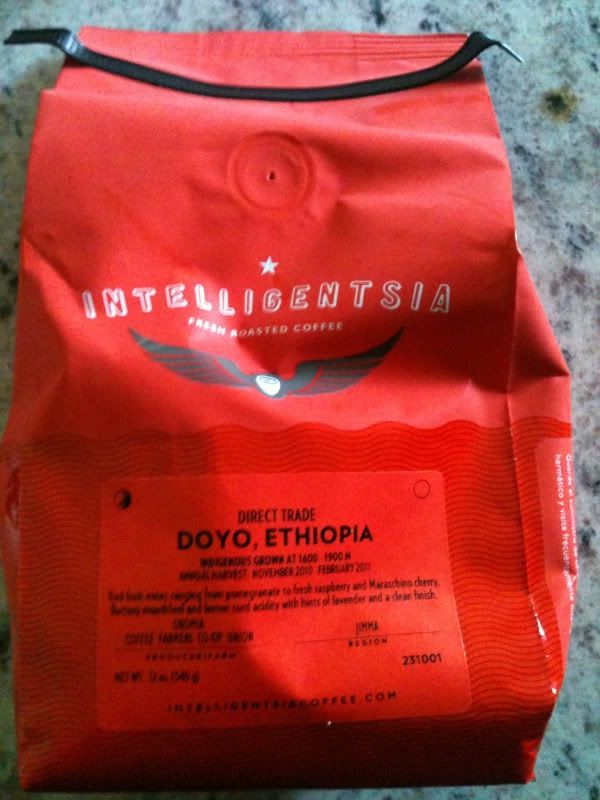
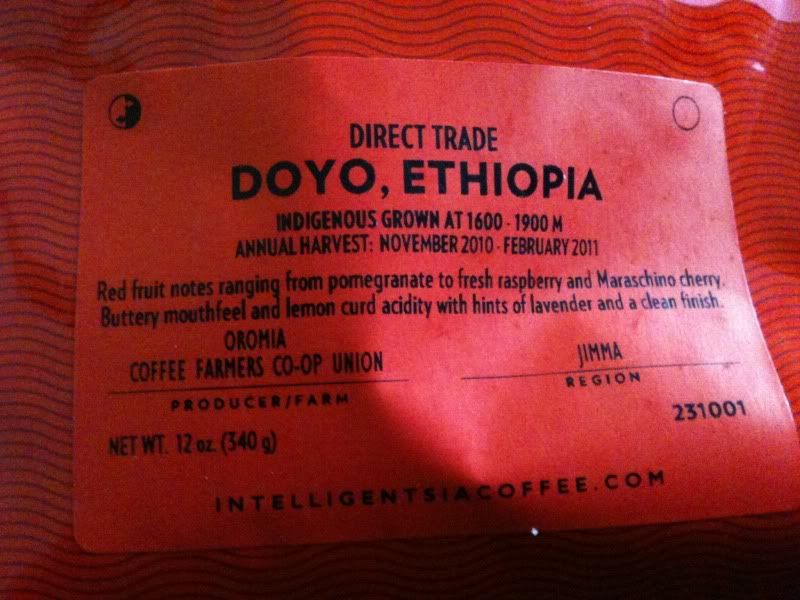
The light-roasted beans are of a fairly typical size for African sourced coffee beans.
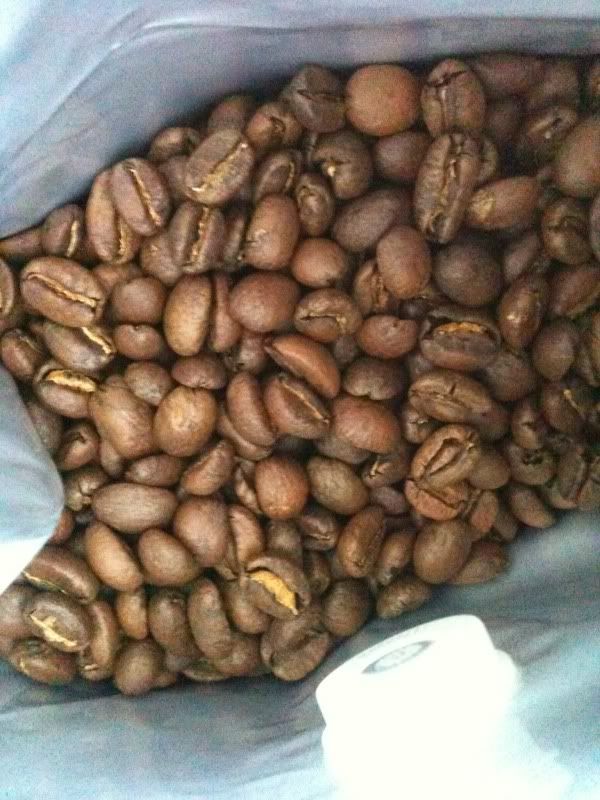
I brewed these aromatic babies up in the french press at 190 degrees with 4 minutes of steeping. A nice thick crema crema of heavenly goodness formed at the top, which thinned a bit when the grounds were stirred for a few seconds. African beans seem to form thinner foamy tops than beans from other countries.
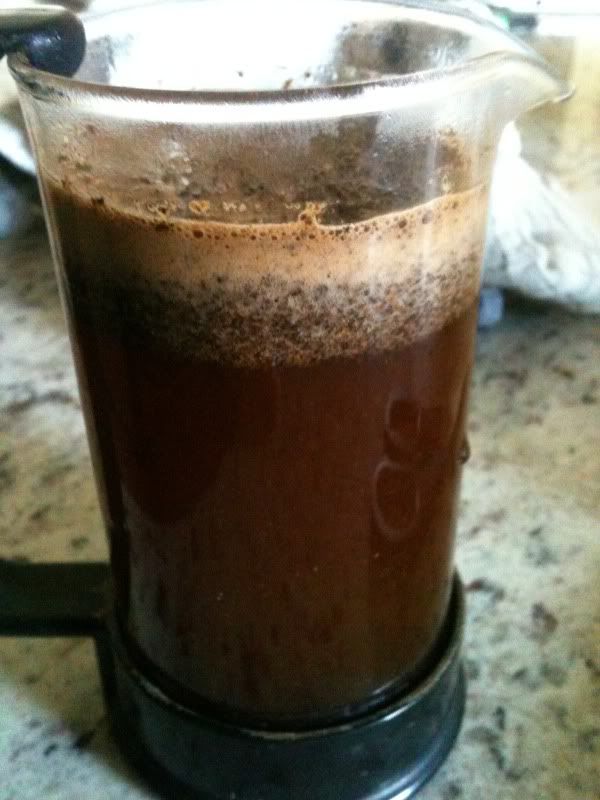
Doyo Ethiopian is awesome. There are simply no other words I can come up with to describe the rich cherry flavors.
The full press release from Intellegentsia may be found here: http://www.intelligentsiacoffee.com/sites/default/files/coffee-product-docs/product-doc/Doyo_ethiopia.pdf
So, in an earlier post, I gave the opinion that Allegro's Ethiopian Adado was perhaps the best coffee I have had to date. Intellegentsia's Doyo is at this same vaunted level. The two coffees are a great contrast in outstanding flavor profiles; the Adado being more citric with berries while the Doyo has a rich deep cherry aroma. Doyo is offered in 12oz packages with a one-way valve.


The light-roasted beans are of a fairly typical size for African sourced coffee beans.

I brewed these aromatic babies up in the french press at 190 degrees with 4 minutes of steeping. A nice thick crema crema of heavenly goodness formed at the top, which thinned a bit when the grounds were stirred for a few seconds. African beans seem to form thinner foamy tops than beans from other countries.

Doyo Ethiopian is awesome. There are simply no other words I can come up with to describe the rich cherry flavors.
Monday, March 5, 2012
Caribou Coffee's Kenya Karibu
My introduction to coffee began in a Caribou Coffee on the north side of Chicago. I spent so much time there studying for school and the bar exam that the baristas and store manager knew me by name and drink preference. I made some great friends and met some very interesting folks, including a WWII / Israeli War of Independence veteran, during my study sessions and when I later moved out of the city, I felt like I was leaving a chapter in my life behind. Sometimes on the weekend, I would have to wait and fight for a table but caribou really creates a relaxed and comfortable environment.
Caribou (CBOU) is the second largest retail coffee chain in the United States behind Starbucks. It started in 1992 outside Minneapolis, MN by Kim and John Puckett. In 1998, they sold a majority stake in the company to Crescent Capital. Crescent Capital later became known as Arcadia Capital. Under Arcadia, Caribou became a publicly traded company on the Nasdaq in 2005. Arcadia sold its shares in Caribou in 2011.
After 2005, Caribou re-made its offerings of coffee beans. Among these is a Kenyan coffee that is only offered during parts of the year. The beans are packaged in a sealed bag with a one-way valve. The bag is 16oz in size. Now Kenyan beans are usually of very high quality and great taste. The result is in a slightly higher price. This is the case with Caribou's Karibu.
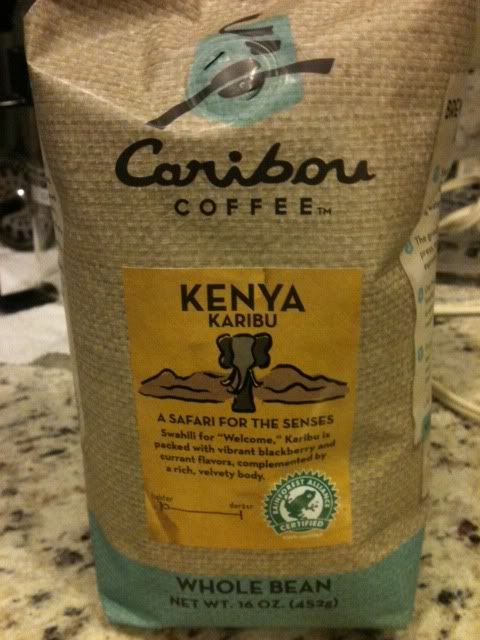
The beans are larger in size and Caribou takes the attractive step of light roasting these beans. As a result, the flavor smacks you in the face as soon as the bag is opened. The predominant aroma of this coffee is blackberry.
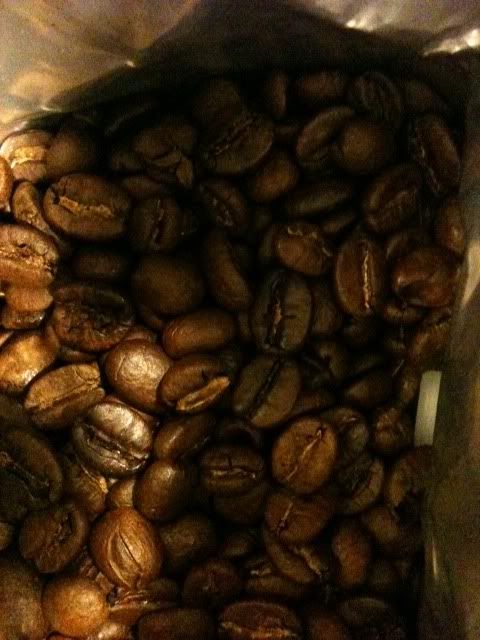
The coffee, when brewed, actually formed a nice little crema. Something I have found hard to achieve with Starbucks beans. The drink is very light in body, delicate and is tart. The blackberry flavor is very strong. I couldn't detect any other flavors in the coffee. The taste was very good but as I moved through the bag, the taste of the coffee began to get weaker. The one thing I enjoy about artisan roasters as opposed to larger retailers like Caribou and Starbucks is that many indicate the roasting date. This is a similar issue that I described earlier with my Illy-fail. I give Caribou props on its Kenya offering. It is a great tasting coffee, much better than I expected from a large retailer. I suspect that the beans had not been recently roasted based on the diminished taste and that leaves me curious as to how much better this coffee could have been had I been brewing it within a week or so of its roasting. I like that this is a light roast. The tarty fruit flavors are really preserved well and made my coffee a very pleasurable experience.
Caribou (CBOU) is the second largest retail coffee chain in the United States behind Starbucks. It started in 1992 outside Minneapolis, MN by Kim and John Puckett. In 1998, they sold a majority stake in the company to Crescent Capital. Crescent Capital later became known as Arcadia Capital. Under Arcadia, Caribou became a publicly traded company on the Nasdaq in 2005. Arcadia sold its shares in Caribou in 2011.
After 2005, Caribou re-made its offerings of coffee beans. Among these is a Kenyan coffee that is only offered during parts of the year. The beans are packaged in a sealed bag with a one-way valve. The bag is 16oz in size. Now Kenyan beans are usually of very high quality and great taste. The result is in a slightly higher price. This is the case with Caribou's Karibu.

The beans are larger in size and Caribou takes the attractive step of light roasting these beans. As a result, the flavor smacks you in the face as soon as the bag is opened. The predominant aroma of this coffee is blackberry.

The coffee, when brewed, actually formed a nice little crema. Something I have found hard to achieve with Starbucks beans. The drink is very light in body, delicate and is tart. The blackberry flavor is very strong. I couldn't detect any other flavors in the coffee. The taste was very good but as I moved through the bag, the taste of the coffee began to get weaker. The one thing I enjoy about artisan roasters as opposed to larger retailers like Caribou and Starbucks is that many indicate the roasting date. This is a similar issue that I described earlier with my Illy-fail. I give Caribou props on its Kenya offering. It is a great tasting coffee, much better than I expected from a large retailer. I suspect that the beans had not been recently roasted based on the diminished taste and that leaves me curious as to how much better this coffee could have been had I been brewing it within a week or so of its roasting. I like that this is a light roast. The tarty fruit flavors are really preserved well and made my coffee a very pleasurable experience.
Subscribe to:
Comments (Atom)





